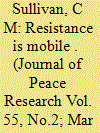|
|
|
Sort Order |
|
|
|
Items / Page
|
|
|
|
|
|
|
| Srl | Item |
| 1 |
ID:
158207


|
|
|
|
|
| Summary/Abstract |
As they pursue information and deploy violence during conflict, combatants compose, catalog, and preserve a wide variety of records, such as memos, investigative reports, and communiqués. In an increasing number of post-conflict scenarios, these records are being archived and released publicly, quickly becoming a critical new source of data for studies of peace and conflict. The objective of this special issue is to advance a new research agenda focused on the systematic analysis of conflict archives. The contributors each spent significant time collecting original data from often-dusty archives and, in many cases, developed new methodologies for sampling, cataloging, and analyzing historical documents. Their findings reveal how violence simultaneously shapes and is shaped by factors that remain largely unobservable using more conventional sources of conflict data, including clandestine mobilization, bureaucratic accountability, and political identities. By considering these studies in relation to one another, this introduction aims to provide readers with a comprehensive understanding of field research strategies and analytical techniques for studying original data from conflict archives. We conclude that while archival data are subject to their own biases that must be considered, this research agenda addresses significant limitations associated with traditional data sources and, in turn, pushes scholars to rethink many of the mechanisms underlying the causes and dynamics of peace and conflict.
|
|
|
|
|
|
|
|
|
|
|
|
|
|
|
|
| 2 |
ID:
158210


|
|
|
|
|
| Summary/Abstract |
An emerging consensus holds that achieving successful counter-movement outcomes requires combining overt repression (e.g. raids, arrests, and targeted assassination) with covert repression (e.g. monitoring, agents provocateurs, and wiretapping). Research in this article disputes the presumed complementarity between overt and covert repressive tactics. When overt repression signals new information about the state’s covert intelligence collection program, challengers respond in ways that frustrate efforts to accumulate new intelligence. These propositions are investigated using original, weekly panel data on a black nationalist insurgent organization, the Republic of New Africa (RNA), and US Red Squad counter-movement activities directed against this group (between 1968 and 1971). Using archived materials generated by various policing agencies and their rivals in the RNA, the analyses provide new understanding of dynamics rarely observed or analyzed systematically. Findings reveal that the two methods of political repression can work at cross purposes. Overt repression motivates challenger adaption towards less readily observable tactics and organizational forms; covert repression subsequently fails to identify challengers’ actions or identities. These findings hold even while controlling for challenger mobilization and government investment in covert repression. In addition to advancing our understanding of what happens to behavioral challengers when governments repress, the results help to shed light on some of the factors that make defeating domestic challengers so difficult. Each ‘step forward’ taken by counter-movement forces potentially makes the next one more difficult.
|
|
|
|
|
|
|
|
|
|
|
|
|
|
|
|
|
|
|
|
|